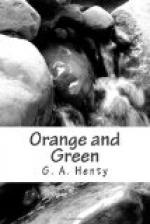There was, indeed, but one hope, on the part of the English, of retrieving the day; namely, the success of the attempt to force the passage at Aughrim. But two horsemen abreast could pass under the castle walls. Saint Ruth was aware of the passage, but thought it impassable for cavalry. It might easily have been made so, by cutting a deep gap across it; but here, as at Athlone, his overconfidence proved his destruction. He had, however, taken the precaution to erect a battery commanding the passage, and had placed some battalions of infantry there.
General Talmash, who commanded the English cavalry, knew that the battle was lost, unless he could succeed at this point; and, at the head of his command, he led the way along the pass, which was not only narrow, but broken and encumbered with the ruins of the castle wall. Saint Ruth beheld the attempt of the cavalry with astonishment, and, with the remark: “They are brave fellows, it is a pity they should be sacrificed,” sent orders for the Irish horse to move forward and prepare to charge them; and moved down the hill at the head of his officers to the battery.
There is no doubt as to what the result would have been, had the Irish horse charged. They were greatly superior in number, and the English cavalry who had got across the passage were still in confusion, and were suffering from the fire of the battery, and, indeed, even when in equal numbers, William’s cavalry had never withstood the charge of the Irish. It seemed that nothing could avert the defeat of the body on which Ginckle’s last hope rested.
But at this moment one of those events, by which Providence overrules the calculations of man, occurred. A cannonball struck Saint Ruth, as he stood in the middle of the battery and killed him instantly. The occurrence paralysed the Irish army. Sarsfield was away, there was no one to give orders, the news that some extraordinary calamity had happened spread rapidly, the men in the battery ceased firing, the cavalry, receiving no orders to charge, remained immovable.
Talmash took advantage of the pause to get the rest of his cavalry across the passage, and then, with his whole force, moved towards the centre. As he approached, the idea that the unknown calamity, of which they had heard, was that the British had defeated their own left, spread among the Irish, and they began to fall back. The British column on the edge of the bog advanced, Ginckle pushed several fresh battalions across the morass in the centre, and the Irish infantry fell back, disputing every inch of the ground.
The cavalry were still without orders, for strangely enough, no one assumed the command on the death of Saint Ruth. As night came on, the retreat of the Irish infantry became a rout, but the cavalry halted on the summit of Kilcomeden, and covered the retreat.




